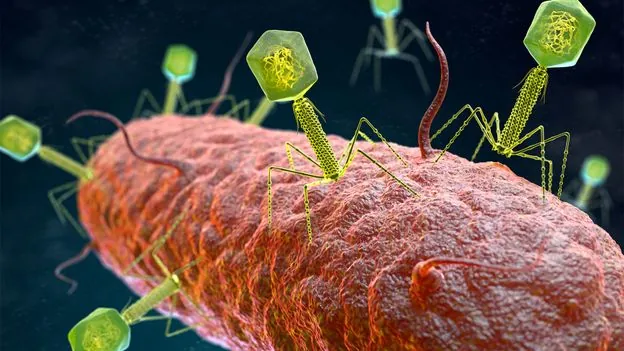
Hidden Kingdom of Viruses in Your Gut: The Dance of Bacteriophages
2024-09-17
The Mysterious World of Viruses in Your Gut
Did you know that your gut is home to a mysterious world of viruses? While most people are familiar with the concept of the microbiome—those trillions of bacteria and other microscopic life forms residing in our intestines—a lesser-known player is emerging: the phageome. These tiny entities, known as bacteriophages (which means "bacteria eaters" in Greek), are stealthy viruses that prey on bacteria and play an essential role in maintaining our gut health.
The Role of Bacteriophages in Gut Health
Recent advancements in science have revealed the staggering presence of these phages in our digestive systems, estimated to number in the billions or even trillions. Researchers like Breck Duerkop from the University of Colorado are diving deep into phageome science, uncovering the intricate ways in which these viruses interact with our gut bacteria. Understanding this delicate balance could pave the way for revolutionary treatments that enhance human health.
Good Phages and Bad Phages
“There will be good phages as well as bad phages,” notes Paul Bollyky, an infectious disease expert at Stanford Medicine. However, determining the exact population of phages in our guts remains a challenge. Some bacteria have the genetic material of phages integrated into their genomes but may not actively produce the viruses.
The Dark Matter of the Phageome
One of the most fascinating aspects of phage research is the exploration of what scientists refer to as the "dark matter" of the phageome—the unknown viruses yet to be identified. Currently, the Gut Phage Database lists over 140,000 distinct phages, and experts believe this is just the tip of the iceberg.
The Significance of crAssphages
Notably, researchers recently identified a common group of gut phages known as crAssphages. These viruses are shaped like a light bulb, equipped with a unique structure that allows them to inject their DNA into host bacteria. Their significance rests on their ability to infect one of the dominant types of gut bacteria, Bacteroides, hinting at their potential impact on our health.
A Delicate Dance Between Phages and Bacteria
The relationship between phages and bacteria is an intricate dance rather than a relentless battle. While phages can indeed kill bacteria, they also facilitate genetic exchange that can benefit their hosts, potentially providing new abilities such as antibiotic resistance or the capability to digest complex carbohydrates. This dynamic interaction allows bacteria to remain adaptable and resilient to change—like a wolf pack ensuring balance within its territory.
The Diversity of Phageomes
Variation in individual phageomes is astounding, shaped by factors like age, sex, diet, and lifestyle. This diversity is crucial, as a rich variety of phages ensures a stable and healthy bacterial ecosystem. However, disturbances in this balance—such as illness or dietary changes—can lead to detrimental health outcomes. Researchers are linking shifts in phage diversity to conditions like inflammatory bowel syndrome (IBS) and colorectal cancer.
Lifestyle Choices and Phage Balance
Furthermore, lifestyle choices can also affect this delicate balance. While many people attempt to restore microbiome health through dietary changes or more radical approaches like fecal transplants, targeting phages might offer a more nuanced solution. Researchers are exploring the possibility of using specific phages therapeutically to combat harmful bacteria, such as those responsible for stomach ulcers.
Conclusion: The Importance of Bacteriophages
Ultimately, we may not fully grasp the complexities of our gut's phage ecosystem yet, but it is clear that these trillions of phages act as crucial regulators. They maintain microbial diversity, fend off potentially harmful overgrowths, and keep our digestive systems functioning smoothly. As research continues, we may find ourselves not just grateful for our gut bacteria—but for the hidden army of viruses that support them.
Looking Ahead
Stay tuned, as scientists delve deeper into this captivating realm—the dance partnership of bacteriophages and gut bacteria could hold the key to many health mysteries. Are you ready to unlock the secrets of your gut ecosystem?





 Brasil (PT)
Brasil (PT)
 Canada (EN)
Canada (EN)
 Chile (ES)
Chile (ES)
 España (ES)
España (ES)
 France (FR)
France (FR)
 Hong Kong (EN)
Hong Kong (EN)
 Italia (IT)
Italia (IT)
 日本 (JA)
日本 (JA)
 Magyarország (HU)
Magyarország (HU)
 Norge (NO)
Norge (NO)
 Polska (PL)
Polska (PL)
 Schweiz (DE)
Schweiz (DE)
 Singapore (EN)
Singapore (EN)
 Sverige (SV)
Sverige (SV)
 Suomi (FI)
Suomi (FI)
 Türkiye (TR)
Türkiye (TR)